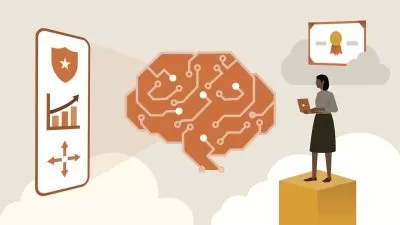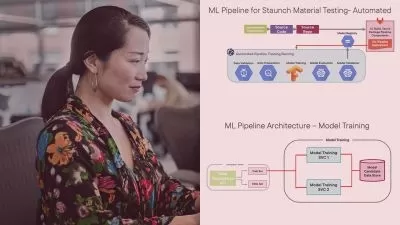Build a Large Language Model from Scratch (early access), Video Edition
Focused View
8:12:00
0 View
Appendix A. Automatic differentiation made easy.mp4
03:54
Appendix A. A typical training loop.mp4
07:25
Appendix A. Exercise answers.mp4
01:45
Appendix A. Further reading.mp4
02:08
Appendix A. Implementing multilayer neural networks.mp4
08:47
Appendix A. Introduction to PyTorch.mp4
15:16
Appendix A. Optimizing training performance with GPUs.mp4
17:11
Appendix A. Saving and loading models.mp4
01:50
Appendix A. Seeing models as computation graphs.mp4
02:26
Appendix A. Setting up efficient data loaders.mp4
08:19
Appendix A. Summary.mp4
01:21
Appendix A. Understanding tensors.mp4
07:20
Appendix D. Adding Bells and Whistles to the Training Loop.mp4
02:58
Appendix D. Cosine decay.mp4
01:46
Appendix D. Gradient clipping.mp4
03:16
Appendix D. The modified training function.mp4
01:29
Appendix E. Initializing the model.mp4
01:14
Appendix E. Parameter-efficient Finetuning with LoRA.mp4
04:44
Appendix E. Parameter-efficient finetuning with LoRA (1).mp4
09:04
Appendix E. Preparing the dataset.mp4
01:30
Chapter 1. Applications of LLMs.mp4
02:11
Chapter 1. A closer look at the GPT architecture.mp4
05:23
Chapter 1. Building a large language model.mp4
01:49
Chapter 1. Introducing the transformer architecture.mp4
07:02
Chapter 1. Stages of building and using LLMs.mp4
04:33
Chapter 1. Summary.mp4
02:04
Chapter 1. Understanding Large Language Models.mp4
08:35
Chapter 1. Utilizing large datasets.mp4
03:53
Chapter 2. Adding special context tokens.mp4
05:57
Chapter 2. Byte pair encoding.mp4
04:44
Chapter 2. Converting tokens into token IDs.mp4
05:38
Chapter 2. Creating token embeddings.mp4
05:25
Chapter 2. Data sampling with a sliding window.mp4
09:15
Chapter 2. Encoding word positions.mp4
07:09
Chapter 2. Summary.mp4
01:51
Chapter 2. Tokenizing text.mp4
06:07
Chapter 2. Working with Text Data.mp4
08:09
Chapter 3. Attending to different parts of the input with self-attention.mp4
15:20
Chapter 3. Capturing data dependencies with attention mechanisms.mp4
03:01
Chapter 3. Coding Attention Mechanisms.mp4
06:43
Chapter 3. Extending single-head attention to multi-head attention.mp4
14:12
Chapter 3. Hiding future words with causal attention.mp4
12:44
Chapter 3. Implementing self-attention with trainable weights.mp4
17:54
Chapter 3. Summary.mp4
01:44
Chapter 4. Adding shortcut connections.mp4
05:36
Chapter 4. Coding the GPT model.mp4
09:28
Chapter 4. Connecting attention and linear layers in a transformer block.mp4
05:37
Chapter 4. Generating text.mp4
08:19
Chapter 4. Implementing a GPT model from Scratch To Generate Text.mp4
11:53
Chapter 4. Implementing a feed forward network with GELU activations.mp4
06:51
Chapter 4. Normalizing activations with layer normalization.mp4
10:30
Chapter 4. Summary.mp4
01:29
Chapter 5. Decoding strategies to control randomness.mp4
12:10
Chapter 5. Loading and saving model weights in PyTorch.mp4
03:30
Chapter 5. Loading pretrained weights from OpenAI.mp4
08:59
Chapter 5. Pretraining on Unlabeled Data.mp4
29:18
Chapter 5. Summary.mp4
01:10
Chapter 5. Training an LLM.mp4
07:44
Chapter 6. Adding a classification head.mp4
09:57
Chapter 6. Calculating the classification loss and accuracy.mp4
05:25
Chapter 6. Creating data loaders.mp4
07:21
Chapter 6. Finetuning for Classification.mp4
04:59
Chapter 6. Finetuning the model on supervised data.mp4
06:12
Chapter 6. Initializing a model with pretrained weights.mp4
02:18
Chapter 6. Preparing the dataset.mp4
04:16
Chapter 6. Summary.mp4
01:25
Chapter 6. Using the LLM as a spam classifier.mp4
01:50
Chapter 7. Conclusions.mp4
03:22
Chapter 7. Creating data loaders for an instruction dataset.mp4
03:53
Chapter 7. Evaluating the finetuned LLM.mp4
10:22
Chapter 7. Extracting and saving responses.mp4
06:00
Chapter 7. Finetuning the LLM on instruction data.mp4
07:06
Chapter 7. Finetuning to Follow Instructions.mp4
03:42
Chapter 7. Loading a pretrained LLM.mp4
04:34
Chapter 7. Organizing data into training batches.mp4
15:09
Chapter 7. Preparing a dataset for supervised instruction finetuning.mp4
05:15
Chapter 7. Summary.mp4
01:14
More details
User Reviews
Rating
average 0
Focused display
Category

O'Reilly
View courses O'ReillyO'Reilly Media is an American learning company established by Tim O'Reilly that publishes books, produces tech conferences, and provides an online learning platform. Its distinctive brand features a woodcut of an animal on many of its book covers.
- language english
- Training sessions 77
- duration 8:12:00
- Release Date 2024/11/03










